Kevin MacDonald’s Individualism & the Western Liberal Tradition
Morris van de CampKevin B. MacDonald
Individualism and the Western Liberal Tradition: Evolutionary Origins, History, and Prospects for the Future
Self-published, 2019
Kevin B. MacDonald is famous – or notorious, depending on who you ask – for examining the Jewish ethnic group from a genetic, Darwinian, and cultural perspective. His three published books on the subject are called The Culture of Critique series, after the final volume, which remains his best-known work. If you haven’t already, you should buy and read these books and then donate them to every library that will take them. MacDonald’s work was mostly ignored until the rise of the neoconservatives, many of whom were Jews, within the George W. Bush administration, when they authored the Iraq War. MacDonald’s work on the Jews made the screw-up that was America’s adventure in Iraq easier to understand. MacDonald is a prophet.
His latest book now takes a look at European culture from a genetic, Darwinian, and cultural perspective. It represents the summation of forty years of MacDonald’s scholarly endeavors. He draws on the latest genetic science to argue that Europeans comprise three different groups: Western Hunter Gatherers, Early Farmers, and Indo-Europeans. All these groups have intermarried to a degree, but northern Europe was more defined by Western Hunter Gatherers and Southern Europe by Early Farmers. The Indo-Europeans conquered the whole of Europe and became its aristocracy more than 4,500 years ago. Sweden’s native population contains the most Western Hunter Gatherer DNA, and Sicily’s people have the most Early Farmer genetic material. Sweden’s population is highly individualistic, but operates with a societal consensus, while Sicily has strong families but little cooperation at the societal level.
The Three Groups that Make Up the Europeans
Western Hunter Gatherers are Europe’s indigenous population. They have some Neanderthal DNA, indicating inbreeding in the distant past. They have been selected for fair skin, light eyes (i.e., blue or green), and high IQ. Western Hunter Gatherers have a culture of egalitarian individualism. The “Hunter Gatherer” label shouldn’t imply a savage, backwards culture. The society was complex even in antiquity, and individuals were expected to interact in an honest way towards others. Reputation is important, and Western Hunter Gatherers tended to form moral communities. Genetically, they are a relatively homogeneous group.
The Early Farmers originated in Anatolia, but are genetically different from the modern Anatolians, who’ve had a divergent genetic history since antiquity. They migrated from the eastern Mediterranean into Europe. It was they who brought the agricultural revolution to Europe.[1] The Early Farmers are more collectivist than the Western Hunter Gatherers at the family level.
Both Western Hunter Gatherers and Early Farmers were more individualistic than other groups, such as the Chinese, Jews, Arabs, and so on. However, there is a difference between the two that shows up in France. North of the “Eternal Line”[2] which runs from St. Malo to Geneva, the population has more Western Hunter Gatherer DNA; south of it, the French population has more Early Farmer DNA. Indeed, a comparison between the north and south of France is a case study in how genetic heritage has an impact on society.
To further emphasize how different the egalitarian individualist culture of the Western Hunter Gatherers is from that of the Early Farmers, MacDonald contrasts Salem, Massachusetts – where people from East Anglia settled in the 1600s (Western Hunter Gatherers) – to Montaillou, France. In Salem, even in colonial times, women married at a later age than in Montaillou and had a more prominent role in their family affairs. The men of this town were able to enter into fifty or more different trades, while those in Montaillou were restricted to farming or herding.[3]
Indeed, there is a large divide, with the south of France being less economically dynamic than the north. An even greater divide like this is in Italy. In Belgium, the French-speaking Wallonians are less economically successful then the Dutch-speaking Flemish. This demonstrates that the culture of egalitarian individualism creates an economic dynamism that is hard to match.
One cannot help but notice that modern DNA findings very much match the findings of earlier racial theorists like William Z. Ripley, Madison Grant, and Carleton S. Coon. If we adapt MacDonald’s findings to their terms, the Western Hunter Gatherers are Nordics and the Early Farmers are Mediterranean. In the early twentieth century, Jewish activists bristled at the study of the races of Europe. In The Culture of Critique, MacDonald demonstrates how Jewish “scientists” called cultural anthropologists, led by Franz Boas, took over the field of anthropology and declared that the physical anthropologists, led by Madison Grant, were pseudo-scientists.
Since then, it has become clear through DNA studies that the physical anthropologists were correct and Boaz and his school were wrong,[4] if not outright lying. Grant got the two major groups correct – i.e., Nordics and Mediterraneans. He was somewhat off in his understanding of the Alpine Race, but he wasn’t entirely wrong: Finns (Alpines) are genetically different from the nearby Swedes, Balts, and Norwegians (Nordics). Additionally, Turks (Alpines) are different from Greeks and Sicilians (Mediterraneans). The idea of an Alpine Race is correct insofar as those categorized as Alpines are clearly different from Mediterraneans and Nordics, but they are not a unified category in themselves.[5]
The Indo-Europeans arose from genetic populations called Caucasian Hunter Gatherers, Ancient North Eurasians, and Eastern Hunter Gatherers in the area north of the Black Sea. This group has also been referred to by the neologism “Yamnayans.” This group were herders, used the horse, developed wheel and axle technology, and had a hyper-competitive military culture. Their language spread across the world. The Indo-Europeans conquered and intermarried with both Western Hunter Gatherers and Early Farmers, but more Indo-European DNA is in Northern Europe (especially the Baltic region) simply because there were fewer people in general there when they arrived. The Indo-Europeans are extremely important in understanding why Europeans are so much more dynamic than other races.
Aristocratic Individualism: The Way of the Indo-Europeans
After describing the three genetic groups that make up the European population, MacDonald describes the Indo-Europeans in detail. Essentially, they are the glue that holds Europe together as a cultural unit. Nearly all languages in Europe are Indo-European, and it is likely that the drive for excellence in all fields of human endeavor came from the nature of the Indo-European conquerors. “The novelty of Indo-European culture,” writes MacDonald, “was that it was based neither on centralized kingship nor clan-type extended kinship groups, but on an aristocratic elite that was egalitarian within the group.”[6] The basic war-band that was the basis of Indo-European society has been named the Männerbund by scholars.
This aristocratic elite was not as small as one might suppose. Often, every freeman able to bear arms was considered part of it. Genetic evidence clearly shows that the Indo-Europeans did not wipe out the people they came into contact with. They often intermarried with the conquered group, and subject peoples were assimilated. Furthermore, the Indo-Europeans had social classes that were permeable. Ambitious men could rise above their original station through merit – especially military merit. This is directly the opposite of what was the case in Jewish society, where Joshua and Moses exterminated the populations of those they conquered down to their farm animals.
Indo-European society was a three-part system: priests, warriors, and merchants. Despite these divisions, there was a place for all in the social system. From very early on, low-born persons could get their day in court against aristocrats. Even the Indo-European Hittites had more progressive laws than the Semitic Babylonians (this isn’t mention in MacDonald’s book, but it is consistent with his ideas.)
The Greek and Roman cultures were highly Indo-European. However, their political organization was different. The Greeks had less permeability. Spartans and Athenians didn’t naturalize people of merit, and they couldn’t work together. Thus divided, they were conquered by Greek-speaking Macedonians, and then later by the Romans. Conversely, the Romans developed a way to naturalize the people they conquered. This was first applied to the nearby Latins and Sabines, and then to the rest of Italy. Rome’s army grew, and people came to realize that it was easier and better to join the Romans than to try to beat them.
The problem, however, was that the Romans most certainly lost something when they applied citizenship more broadly. There were problems with naturalizing fellow Latins, but even greater ones when naturalizing Italians (the Social War of 91 to 88 BC was one such difficulty). Eventually, the Roman Republic became the Roman Empire, and by the time the Empire came to an end, the great Patrician families had died out and citizenship had become meaningless. There is a right-sizing to assimilating and naturalizing other peoples. Rome did well with assimilating Europeans with Indo-European/Early Farmer genetic stock, had more problems when it came to Indo-European/Western Hunter Gatherers from the north, and they didn’t assimilate Jews at all.
The Indo-Europeans were indeed remarkable, but not all the places conquered by them created cultures which had the same dynamism of Europe. Iran is more vigorous a nation than any of its Arab neighbors, but Pakistan and Afghanistan are backwards societies, and India is certainly less developed. In the long run, it mattered who the peoples that the Indo-Europeans conquered were. Essentially, Greeks were far more dynamic than Persians, for example, even though both were Indo-European.
Monogamy in Marriage
MacDonald goes into considerable detail regarding the different marriage patterns among European groups. There is one commonality between the three groups: the marriage pattern is one man + one woman, ideally until death parts them. This is considerably different from other parts of the world, where one wealthy man + many women is the norm. Monogamy cuts away the considerable drama produced by polygyny: poorer children, large groups of idle and dangerous unmarried young men, intrigue between wives, inheritance issues, and so on.
MacDonald discusses how the Roman Catholic Church enforced monogamy upon elite males in Europe and enforced celibacy upon its own members. The Church was not the only factor in this, however, as monogamy existed in Europe prior to Christianity. In controlling sex, the Catholic Church gained considerable moral credibility and devoted adherents. This caused the Church’s contributions in other areas, such as scientific inquiry and scholarship, to also advance.
Egalitarian Individualism: Western Hunter Gatherers & the English Civil War
MacDonald argues that the English Civil War (1642–1651) was a tremendous shift in the historical trajectory of the European peoples. It represented a change from the established Indo-European way of aristocratic individualism and toward the egalitarian individualism of the Western Hunter Gatherers.
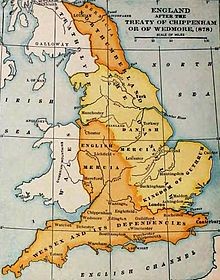

Above left: The Danelaw, the part of England with more Danish (Western Hunter Gatherer) DNA. Above right: In yellow are the parts of England that sided with Parliament during the English Civil War. Below: The origin of Massachusetts’s Puritan founders. Both Cromwell’s Roundheads and the Yankees are the product of England’s most Western Hunter Gatherer areas, and it has a high IQ culture organized into moral communities with a heavy emphasis on fairness.

MacDonald writes:
The radicalism of the Puritan Revolution was that it eventually destroyed the old tri-partite Indo-European order based on domination of a military elite. This revolution was far more radical than that whereby Christianity destroyed the pagan gods of Old Europe because it “flattened the foundational myths of the trifunctional social order characterizing of all Indo-European peoples.” The Puritan Revolution and its aftermath eventually ended the Indo-European world and its Christian version: the king and aristocracy (“those who fought bellatores”), the Church (“those who prayed, oratores”), and the commoners (“those who worked, laboratores”).[7]
Critical to this shift was altruistic punishment. The English Puritans formed a moral community that viciously punished those who deviated from their standard. This culture was transplanted to Massachusetts via the Winthrop Fleet, and then spread across the United States.
The opposing values of Indo-European aristocratic individualism and Western Hunter Gatherer egalitarian individualism came into conflict again in North America during the American Civil War. The long fuse that led to the Civil War began with the lingering unresolved issues from the English Civil War that had been transplanted to the United States via the northern Puritans (Western Hunter Gatherers) and the distressed Cavaliers of the South (Indo-Europeans), and as a result these two cultures had different approaches to the institution of slavery. The Northerners carried out a long-running campaign of moral aggression against the South, even though slavery had been practiced nearly everywhere in the world and was even specifically permitted in the Bible. With that in mind, the Civil War should be seen as a form of altruistic punishment, whereby the Northerners went to war with their near-cousins in the South over the status of Africans.

Free Soil Party voters in the 1852 election. This shows the spread of the descendants of the Puritans (Western Hunter Gatherers) juxtaposed with their values of egalitarian individualism.
The Quakers
MacDonald doesn’t focus on the considerable impact that the Quakers had on American culture, but he does remark in great detail on the Quaker impact on England’s anti-slavery policies, which predated abolitionism in America by a generation. Quakers were from a different part of England than the Puritans, but the trend of Western Hunter Gatherer values in opposition to Indo-European values still holds. Quakers were English and Irish, and came from the areas that were settled by the (Western Hunter Gatherer) Norse in the Middle Ages.
The thing about the abolitionists is that although they were radicals, they “achieved a moral imperative to the point that among the public in general it ‘was associated with politeness, sensibility, patriotism, and a commitment to British liberty.’ It could therefore be utilized as a battering ram against immorality in other areas.”[8]
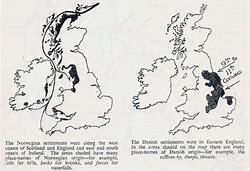

Quakers arose in those parts of England settled by the Norse.
Altruistic Punishment, Moral Aggression, & Yankees vs. Jews
MacDonald speculates that the egalitarian individualist values of the Western Hunter Gatherers – and especially the descendants of America’s Puritans – could have sown the seeds of its own destruction. However, there is reason for hope. It is clear that there is a considerable overlap between Indo-European aristocratic individualism and Western Hunter Gatherer egalitarian individualism. Many of the anti-slavery ministers were motivated by the same zeal for glory[9] as any Indo-European in a chariot. Furthermore, it is clear that the Puritan champion Oliver Cromwell’s New Model Army was every bit as much a Männerbund as any other Männerbund.
MacDonald says of the Puritan’s most defining trait:
Moralistic aggression is not inherently wrong. The key is to convince Whites to alter their moralistic aggression in a more adaptive direction in light of Darwinism. After all, the object of moralistic aggression is quite malleable.[10]
In modern America, however, it is the anti-white Jewish “culture of critique” that defines our culture. This culture of critique
. . . in effect created a moral community that is radically opposed to the interests of Whites. And as with the Puritans, the new elite has been able to create a culture of altruistic punishment in which White people punish fellow Whites who deviate from the dogmas of the moral community created by the new elite [i.e. Jews], even at the cost to compromising the long-term interests of themselves and their descendants.[11]
I believe that this Jewish ability to hijack altruistic punishment is unstable and only temporary. It is clear to this author that the single largest ethnic conflict in American history is that between Yankees and Jews. So far, the Jews have practiced aggression against the Yankee without receiving any response, but this situation will not continue indefinitely. People will always eventually respond to attacks.
Notes
[1] An example of the Early Farmers were the Etruscans. Their language was (probably) not in the Indo-European family group, and their origin myth claimed that they came from Anatolia. DNA studies confirm that the Etruscans probably did originate in Anatolia.
[2] One description of the difference between northern and southern France can be found in the Imperial Magazine: or, compendium of religious, moral, and philosophical knowledge: Volume 9, London, 1827, page 242: “On the north there are only thirty-two departments, and thirteen millions of inhabitants; on the south there are fifty-four departments, and eighteen millions of inhabitants. The thirteen millions of inhabitants of the north send to school 740,846 pupils; the eighteen millions of inhabitants of the south, send to school 375,931 pupils. The result is, that out of a million of inhabitants, the north of France sends 56,988 children to school; and the south, 20,885. Thus primary instruction is three times more extended in the north than in the south. You shall now see what remarkable consequences result from this disproportion. In the north of France, notwithstanding the rigour of the climate, which forbids the cultivation of the olive, the caper, the orange and the lemon-tree, and scarcely allows the growth of the Indian corn and the mulberry-tree, in a few of the departments contiguous to the southern part, and which deprives Normandy, Picardy, French Flanders, and the Ardennes, of the luxuriance of the vine; not withstanding this privation of so many rich branches of culture, the mass of the northern people, having more instruction, activity, and industry, obtain from the soil a revenue which enables them to pay 127,634,765 fr. For land-tax, for superficies of 18,692,19 hectares, whereas the 54 departments of the south pay only 155,412,269 fr. Land-tax for 54,841,235 hectares.”
[3] MacDonald, Individualism and the Western Liberal Tradition, pp. 141 & 142.
[4] According to David Duke: “Early physical anthropologists were truly race scientists because they studied man and his evolutionary development through the study of the measurable physical characteristics of the human races, past and present. Any good physical anthropologist could pick up a human skull and, based on its characteristics, quickly identify the race of the specimen. Of course, this physiological knowledge was vital in sorting out the unearthed remnants of early man and piecing together man’s prehistory and evolutionary development. Cultural anthropology dealt more with the different contemporary cultures of mankind and culturally related questions of antiquity and prehistory, making it a far less precise science, and one open to wide interpretation.” David Duke, Jewish Supremacism (Mandeville, La.: Free Speech Press, 2007), p. 98.
[5] This sort of misdiagnosis is common as scientists struggle to fully understand how things work. Bright’s Disease was a common diagnosis in the early twentieth century, but has fallen out of use as doctors realized that Bright’s Disease is the result of several other conditions, such as Type 2 Diabetes and hypertension.
[6] MacDonald, Individualism and the Western Liberal Tradition, p. 26.
[7] Ibid., p. 245.
[8] Ibid., p. 341.
[9] Reverend Thomas Clarkson was very much motivated by the desire to win glory for himself by ending slavery. (Ibid., p. 317)
[10] Ibid., p. 499.
[11] Ibid., pp. 497 & 498.
Kevin%20MacDonaldand%238217%3Bs%20Individualism%20and%23038%3B%20the%20Western%20Liberal%20Tradition
Share
Enjoyed this article?
Be the first to leave a tip in the jar!
Related
-
Nowej Prawicy przeciw Starej Prawicy: Przedmowa
-
Is There a Right Wing after Postmodernity? “Euronormativity” and Biopoliticized Resistances to the “Counterhegemonic” Left
-
Stalin’s Affirmative Action Policy
-
Doxed: The Political Lynching of a Southern Cop
-
James M. McPherson’s Battle Cry of Freedom, Part 2
-
James M. McPherson’s Battle Cry of Freedom, Part 1
-
National Socialism as a Magical Movement: Stephen E. Flowers’ The Occult in National Socialism
-
Communist Barbarism in Hungary — and America Today: When Israel Is King
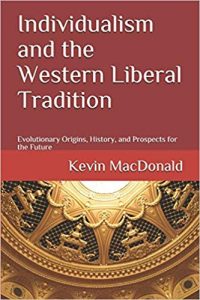
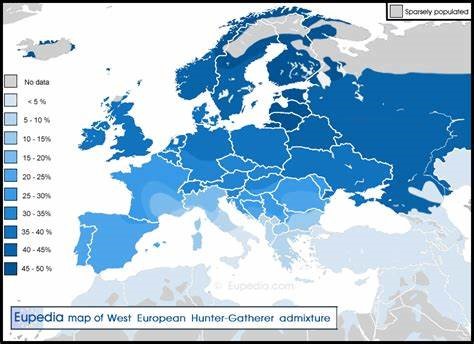
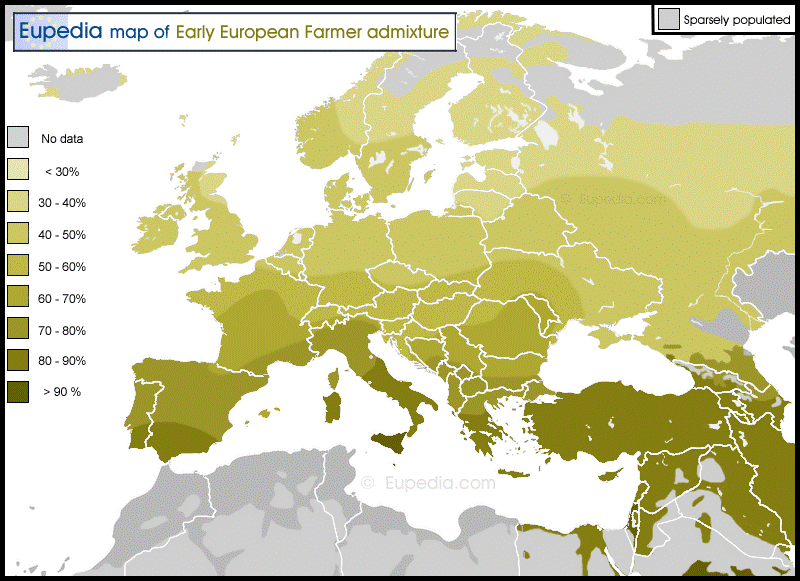
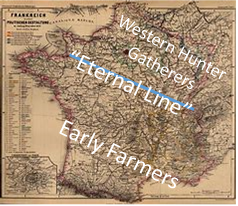


5 comments
“but Pakistan and Afghanistan are backwards societies, and India is certainly less developed.”
‘Pakistan’, ‘Afghanistan’, and ‘India’ are not ethnocentric cultural uniformities. They are part of the Greater Indo-Aryan continuum. They contain different ethnicities. There are traces of Iranian High Culture within these territories, and wherever they are, you would find refinement and development. Moreover, some groups attained an intellectual vigour (they already had the raw materials) when they came into contact with the Anglo-Saxons (British Empire).
The fundamental issue in our part of the world is dysgenics. The various erudite aristocratic classes got drowned in the vast ocean of mediocrity.
The dregs of society, the riff-raff outbred the cultivated.
Very interesting. I did not know that the Yankees and Puritans were predominantly more Hunter-Gatherer than Indo-European. It seems Britain is where the Indo-European element of the West was annihilated, first through the triumph of Democratic values and then again when they bested Germany in the World Wars. I guess the long-dominated Western Hunter-Gatherer got his comeuppance in the end, but at what cost?
I read and loved two books by Dr. Macdonald so far: “Culture of Critique” and “Separation and its Discontents”. Though the former is the more popular book, I actually enjoyed the latter much more and I am mystified as to why it is not talked about more since it concretely analyzed historical instances of Jewish-White conflict. Separation and its Discontents is the best book I have read so far on the JQ.
Looking forward to reading this new title of his and appreciated the review.
If the Puritans had more western hunter-gatherer admixture and the Cavaliers more Indo-European, the difference is likely insignificant. The Anglo-Saxons had a little more WHG ancestry than Insular Celts, but the difference is minuscule, and it would have been made even smaller after a millennium of admixture between the two groups.
https://2.bp.blogspot.com/-emYnl1Xu5N8/Wfb6zcK9gSI/AAAAAAAAGNA/LfFy0mUAVWc774yTCspCo4mdtNGXEJ5MACLcBGAs/s1600/North_Europe_genetic-linguistic_landscape2.png
As far as the claim of Puritans being “predominately more” WHG than IE, this isn’t true; the available literature indicates that NW Europeans across the board have more IE than WHG admixture.
https://www.nature.com/articles/nature14317
https://advances.sciencemag.org/content/5/9/eaaw3492
If anything there may have been different selective pressures in the early Germanic and Insular Celtic populations, which led to certain alleles, from WHG and IE respectively, predominating in them to different degrees.
Regarding Sicilians and Southern Euros in general, they do have more early farmer admixture as MacDonald points out, but in the case of peninsular Italians and Greeks, much if not most of it comes from a post-Neolithic population movement during the Bronze Age, Iron Age, or antiquity (https://advances.sciencemag.org/content/5/9/eaaw3492). This later movement of people from the Near East into Southern Europe also brought with it significant Caucasus hunter-gatherer admixture, which was already present to some degree in Minoan and Mycenean samples.
https://www.nature.com/articles/nature23310
How this admixture reached its present distribution is somewhat of a mystery, although the Bronze Age collapse, Greek colonization around Mediterranean and Black Seas, and the Roman empire could have something to do with it.
Comments are closed.
If you have Paywall access,
simply login first to see your comment auto-approved.
Note on comments privacy & moderation
Your email is never published nor shared.
Comments are moderated. If you don't see your comment, please be patient. If approved, it will appear here soon. Do not post your comment a second time.